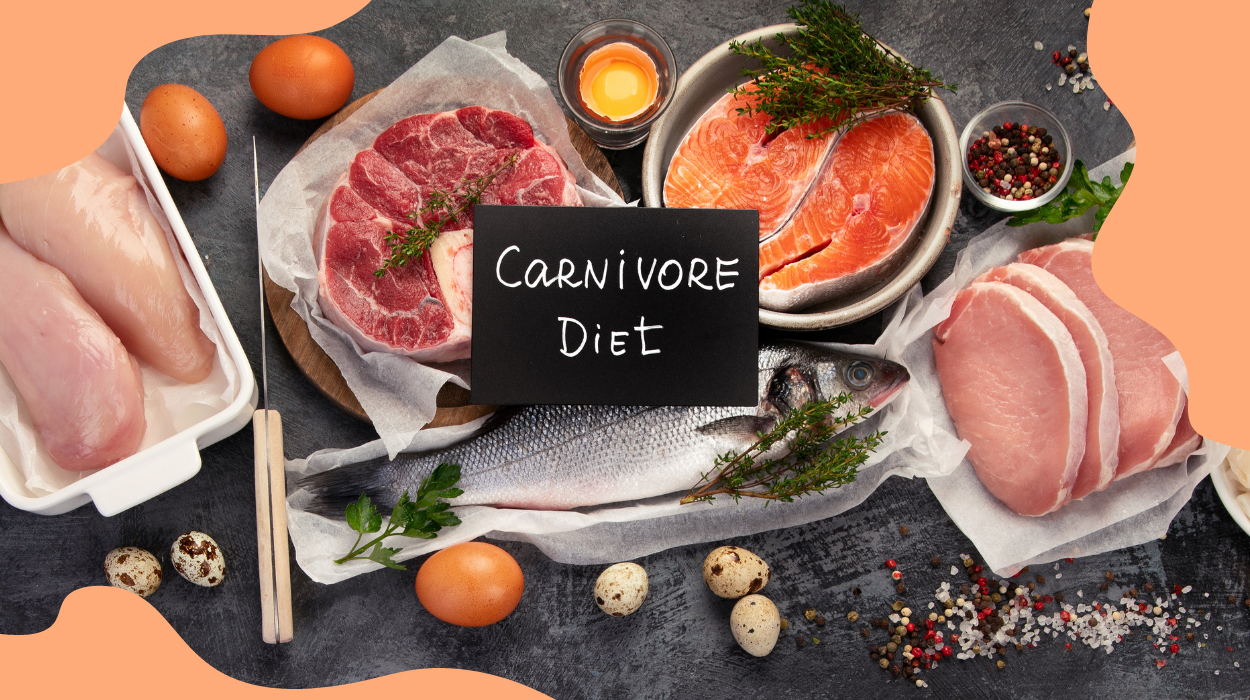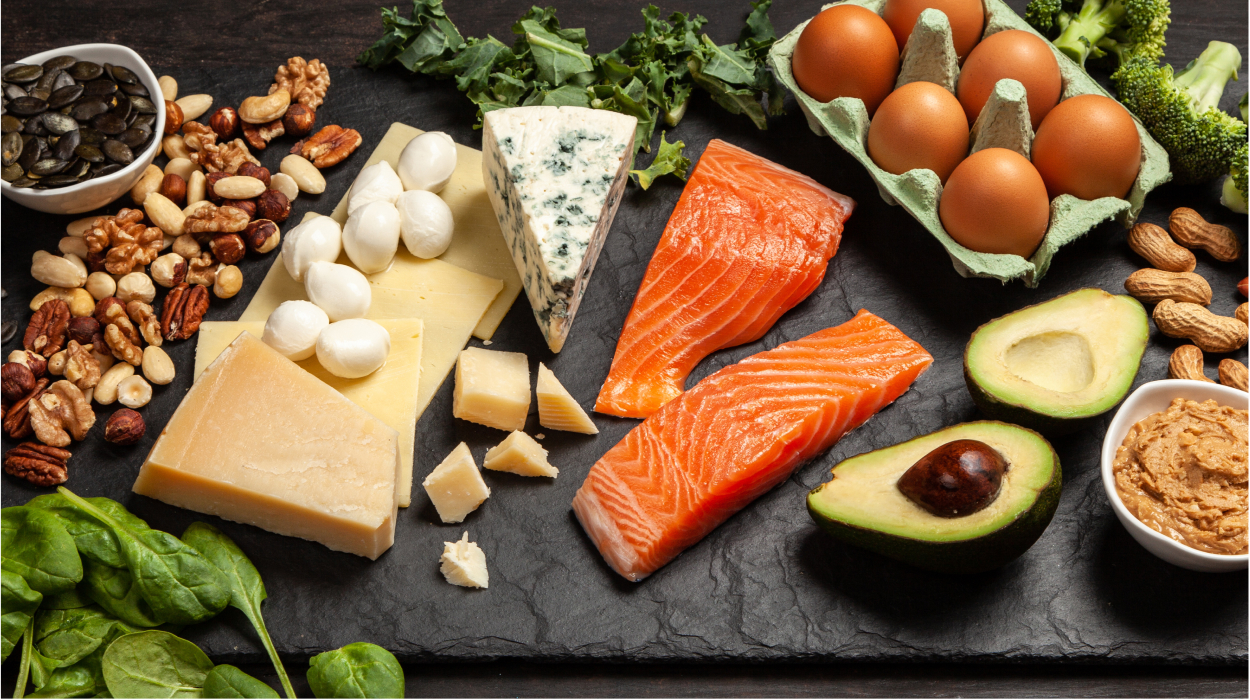 Expert's opinion
Expert's opinion
Expert's opinion
The article is a subjective view on this topic written by writers specializing in medical writing.
It may reflect on a personal journey surrounding struggles with an illness or medical condition, involve product comparisons, diet considerations, or other health-related opinions.
Although the view is entirely that of the writer, it is based on academic experiences and scientific research they have conducted; it is fact-checked by a team of degreed medical experts, and validated by sources attached to the article.
The numbers in parenthesis (1,2,3) will take you to clickable links to related scientific papers.
Carnivore Diet Side Effects: Is It Really Safe For You In 2024?

Your diet choices are fundamental to your well-being. Nutritious foods provide energy to function and keep all body systems running effectively.
The carnivore diet has gained attention for its unique approach to nutrition. This diet focuses exclusively on animal-based foods and excludes plant foods. Proponents of this diet claim that it can lead to weight loss, improved gut health, and better overall health.
However, it’s essential to explore the potential carnivore diet side effects and assess whether it is truly safe for you.
Side Effects Of The Carnivore Diet
The carnivore diet, which primarily consists of animal foods while excluding plant foods, can have several potential side effects:
- Adaptation period.
- Nutritional deficiencies.
- Digestive issues.
- Nutrient imbalance.
- Lack of long-term research.
What Is The Carnivore Diet?
The carnivore diet consists of animal-based meals that exclude plant foods and contain zero carbs. It is a highly restrictive diet emphasizing meat, animal fats, and other animal products.
The meat-only diet excludes all carbohydrates and plant-based nutrition from the meal plan. It’s often a low-carb, high-protein diet, sometimes called a meat-only or all-meat diet, and is typically high in animal fat.
Carnivore dieters believe this way of eating can lead to weight loss[1] and various health benefits. Advocates claim that eliminating carbohydrates and relying solely on animal foods can promote ketosis.
Ketosis[2] is a metabolic state where the body burns fat for fuel instead of carbohydrates.
However, critics raise concerns about this highly restrictive diet’s potential side effects and long-term health implications of a carnivore diet menu.
Common Carnivore Diet Side Effects
The carnivore diet can have several side effects, grouped into the following categories.
The Adaptation Period
When you introduce your body to an extreme diet such as this one, you may suffer a few negative symptoms as your body adapts. The duration is usually a few days to weeks, especially if the change is drastic. You may have diarrhea, feel nauseated, or start craving certain foods,[3] which could lead to weight gain.
Nutritional Deficiencies
The carnivore diet eliminates essential nutrients in plant foods, such as fiber, vitamins, minerals, and antioxidants. This lack of essential nutrients can increase the risk of deficiencies[1] in essential nutrients needed for health.
Digestive Issues
Without dietary fiber from plant foods, you may experience digestive issues like constipation[4] and disrupted gut health. Fiber is crucial in maintaining a healthy digestive system and promoting regular bowel movements. A meat-only diet, like the carnivore diet, lacks fiber.
Nutrient Imbalance,
The diet’s emphasis on animal-based protein and low intake of carbohydrates may disrupt the body’s nutrient balance. Especially if you’re mainly eating processed meats, you be cautious of your salt intake.[5]
As a result, there may be an unbalanced intake of important nutrients, which can affect your metabolism.[6]
Lack Of Long-Term Research
More scientific research is needed since eating red meat while excluding other food groups is a relatively new dietary approach. The lack of data makes it challenging to fully understand the potential risks and benefits associated with the diet.
Also, obtaining clear-cut data is challenging since everyone’s body reacts differently and adapts to the diet at different periods.
Finally, past research suggested that this diet might increase the risk of heart disease. However, recent research disagrees. This might have been due to the high saturated fat intake, which raises lipid levels.[7] However, it is still a topic of contention because recent studies suggest that a red meat diet may reduce coronary heart disease.[8]
It is crucial to consider these potential long-term side effects of a carnivore diet and consult a registered dietitian before starting any new diet. Also, it’s important to take any new research with a grain of salt, as nutrition research constantly evolves.
Please consult with a nutrition professional before exclusively eating meat, even when on a protein powder or any weight loss supplement. A dietitian can guide you on a balanced, nutrient-rich diet that supports your overall health.
Carnivore Diet Benefits
Despite being a highly restrictive eating approach, this meat-only diet still offers some benefits. It is important to note that these perceived benefits are based on anecdotal evidence and are not necessarily backed by a large body of research.
Here are some potential benefits associated with the carnivore meal plan:
Weight Loss
The carnivore diet’s emphasis on a high protein diet and low carbohydrate intake may promote weight loss[9] by inducing ketosis. The body utilizes fat for energy instead of carbohydrates in this metabolic state, helping you shed a few pounds.
Simplified Meal Planning
Carnivore dieters may find meal planning and preparation simpler with a focus on animal-based foods. It becomes more manageable since you only need a few y ingredients to make a carnivore meal.
Increased Satiety
Animal foods are often rich in protein[10] and dietary fats,[11] promoting fullness and satisfaction and potentially reducing hunger cravings.
Eliminating Potentially Inflammatory Foods
A meat-only diet that excludes processed foods and refined carbs may help you develop an anti-inflammatory diet.[12]
Potential Improvement In Metabolism
Following the carnivore diet may improve certain symptoms in various ways. It may help with metabolism,[13] for instance. However, more research is needed to establish any direct causal relationship.
In order to get the most out of any diet, including the carnivore diet, an individual health assessment is vital. Please take note of your dietary tolerances and intolerances, and monitor how your body reacts to a new diet. Trained professionals can provide personalized guidance on this to help you navigate it.
Alternative Choices To The Carnivore Diet
Plenty of alternatives to carnivore foods allow many other nutrient-rich cuisine options. So if you prefer not to follow the strict carnivore diet or are seeking a less extreme diet, consider the following alternatives:
Plant-Based Diets

Plant-based diets such as vegetarian or vegan emphasize consuming plant foods such as fruits, vegetables, whole grains, legumes, and nuts. They can provide ample nutrients, fiber, and antioxidants.
Plant-based diets offer numerous benefits, like improved nutrient intake and higher fiber content. This way of eating can reduce the risk of chronic diseases like heart disease,[14] type 2 diabetes,[15] and breast and colon cancer.[16] Plant-based diets also promote a healthy weight[17] and contribute to environmental sustainability.
There are several types of plant-based diets. Vegetarian diets exclude meat but may include animal products like eggs and dairy, while vegan diets exclude all animal products.
Mediterranean Diet

The Mediterranean diet[18] focuses on whole, nutrient-dense foods. These include fruits, vegetables, whole grains, legumes, nuts, seeds, and healthy fats like olive oil. It also allows other foods like fish and poultry in moderation, dairy, and grass-fed beef products.
The Mediterranean diet is great for brain health and boosts cognitive function[19] due to its high healthy fat content.
Paleo Diet

The paleo diet[20] emphasizes natural, unprocessed foods similar to what our ancestors may have consumed. These foods include lean meats, fish, fruits, vegetables, nuts, and seeds. It excludes processed foods, grains, dairy, and legumes.
On this diet you may lose weight,[21] improve blood sugar control,[22] and reduce inflammation.[23]
Ketogenic Diet

The ketogenic diet[24] focuses on high fat, low carbohydrate, and moderate protein intake. By drastically reducing carbohydrate consumption, the body enters a state of ketosis, burning fat for energy instead of carbs.
The keto diet promotes weight loss,[25] better glucose sugar control,[26] increased satiety,[27] and enhanced mental clarity.[28] It shares similarities with low-carb diets but emphasizes specific carbs, protein, and fat macronutrient ratios to induce ketosis.
These choices provide a range of nutrients and potential health benefits while allowing for flexibility and personalization.
Final Thought
While the carnivore diet has numerous health benefits, you should carefully consider its potential side effects and long-term implications. Possible side effects of the carnivore diet are nutrient deficiencies, digestive system health issues, and nutritional imbalances.
The lack of research on this diet is also a concern.
Thankfully, there are plenty of other healthy diets, such as plant-based, Mediterranean, keto, and paleo. These low or zero-carb diets prioritize consuming whole, unprocessed foods, which can contribute to weight loss. These food groups can also improve brain and heart health, reduce the risk of chronic diseases, and optimize well-being.
Eating organ meats, drinking bone broth, or trying various carnivore diet menus are still merits. However, a health-conscious lifestyle with regular exercise and a balanced diet would be best. Consider adopting a flexible and balanced approach that suits your needs.
Finally, you should consult a healthcare professional or registered dietitian for personalized guidance. Prioritizing a varied, nutrient-dense diet is vital for long-term health and achieving sustainable dietary habits: meat diet or not!
+ 28 sources
Health Canal avoids using tertiary references. We have strict sourcing guidelines and rely on peer-reviewed studies, academic researches from medical associations and institutions. To ensure the accuracy of articles in Health Canal, you can read more about the editorial process here
- Lennerz, B., Mey, J.L., Henn, O.H. and Ludwig, D.S. (2021). Behavioral Characteristics and Self-Reported Health Status among 2029 Adults Consuming a ‘Carnivore Diet’. [online] 5(12), pp.nzab133–nzab133. doi:https://doi.org/10.1093/cdn/nzab133.
- Zhang, G. and Ametaj, B.N. (2020). Ketosis an Old Story Under a New Approach. [online] 1(1), pp.42–60. doi:https://doi.org/10.3390/dairy1010005.
- Meule, A. (2020). The Psychology of Food Cravings: the Role of Food Deprivation. [online] 9(3), pp.251–257. doi:https://doi.org/10.1007/s13668-020-00326-0.
- Mojgan Forootan, Bagheri, N. and Darvishi, M. (2018). Chronic constipation. [online] 97(20), pp.e10631–e10631. doi:https://doi.org/10.1097/md.0000000000010631.
- Partearroyo, T., Samaniego-Vaesken, L., Ruiz, E., Aranceta-Bartrina, J., Gil, A., González-Gross, M., Ortega, R.M., Lluis Serra-Majem and Varela-Moreiras, G. (2019). Sodium Intake from Foods Exceeds Recommended Limits in the Spanish Population: The ANIBES Study. [online] 11(10), pp.2451–2451. doi:https://doi.org/10.3390/nu11102451.
- Liu, H.-Y., Liu, H.-X., Zheng, J.-S. and Cai, D. (2022). Editorial: Metabolic consequences of malnutrition: How to balance nutrients and genes. [online] 9. doi:https://doi.org/10.3389/fnut.2022.1028502.
- Sun, L., Yuan, J., Chen, Q.-C., Xiao, W.-K., Ma, G.-P., Liang, J.-H., Chen, X., Wang, S., Zhou, X.-X., Wu, H. and Hong, C.-X. (2022). Red meat consumption and risk for dyslipidaemia and inflammation: A systematic review and meta-analysis. [online] 9. doi:https://doi.org/10.3389/fcvm.2022.996467.
- Al-Shaar, L., Ambika Satija, Ben Zhong Tang, Rimm, E.B., Smith-Warner, S.A., Stampfer, M.J., Hu, F.B. and Willett, W.C. (2020). Red meat intake and risk of coronary heart disease among US men: prospective cohort study. [online] pp.m4141–m4141. doi:https://doi.org/10.1136/bmj.m4141.
- Hyun-Seung Rhyu and Cho, S.-Y. (2014). The effect of weight loss by ketogenic diet on the body composition, performance-related physical fitness factors and cytokines of Taekwondo athletes. [online] 10(5), pp.326–331. doi:https://doi.org/10.12965/jer.140160.
- Paddon-Jones, D. and Leidy, H.J. (2014). Dietary protein and muscle in older persons. [online] 17(1), pp.5–11. doi:https://doi.org/10.1097/mco.0000000000000011.
- Andrew, Mellor, D., McKune, A.J. and Pumpa, K.L. (2018). Dietary fat, fibre, satiation, and satiety—a systematic review of acute studies. [online] 73(3), pp.333–344. doi:https://doi.org/10.1038/s41430-018-0295-7.
- Bustamante, M.F., Meritxall Agustín-Perez, Cedola, F., Coras, R., Narasimhan, R., Golshan, S. and Guma, M. (2020). Design of an anti-inflammatory diet (ITIS diet) for patients with rheumatoid arthritis. [online] 17, pp.100524–100524. doi:https://doi.org/10.1016/j.conctc.2020.100524.
- Wang, Z., Bergeron, N., Levison, B.S., Li, X.-M., Chiu, S., Jia, X., Koeth, R.A., Li, L., Wu, Y., W.H. Wilson Tang, Krauss, R.M. and Hazen, S.L. (2018). Impact of chronic dietary red meat, white meat, or non-meat protein on trimethylamine N-oxide metabolism and renal excretion in healthy men and women. [online] 40(7), pp.583–594. doi:https://doi.org/10.1093/eurheartj/ehy799.
- Quek, J., Lim, G., Wen Kwang Lim, Cheng Han Ng, Wei Zheng So, Zhi, J., Pan, X., Yip Han Chin, Muthiah, M.D., Siew Hwa Chan, Foo, R., Yip, J., Nithya Neelakantan, Mary Foong-Fong Chong, Poay Huan Loh and Chew, N. (2021). The Association of Plant-Based Diet With Cardiovascular Disease and Mortality: A Meta-Analysis and Systematic Review of Prospect Cohort Studies. [online] 8. doi:https://doi.org/10.3389/fcvm.2021.756810.
- Jardine, M., Kahleova, H., Levin, S., Ali, Z., Trapp, C. and Barnard, N.D. (2021). Perspective: Plant-Based Eating Pattern for Type 2 Diabetes Prevention and Treatment: Efficacy, Mechanisms, and Practical Considerations. [online] 12(6), pp.2045–2055. doi:https://doi.org/10.1093/advances/nmab063.
- DeClercq, V., Nearing, J.T. and Sweeney, E. (2022). Plant-Based Diets and Cancer Risk: What is the Evidence? [online] 11(2), pp.354–369. doi:https://doi.org/10.1007/s13668-022-00409-0.
- Tran, E., Hanna Fjeldheim Dale, Jensen, C. and Gülen Arslan Lied (2020). Effects of Plant-Based Diets on Weight Status: A Systematic Review. [online] Volume 13, pp.3433–3448. doi:https://doi.org/10.2147/dmso.s272802.
- Finicelli, M., Anna Di Salle, Umberto Galderisi and Peluso, G. (2022). The Mediterranean Diet: An Update of the Clinical Trials. [online] 14(14), pp.2956–2956. doi:https://doi.org/10.3390/nu14142956.
- Fu, J., Tan, L., Jung Pyo Lee and Shin, S. (2022). Association between the mediterranean diet and cognitive health among healthy adults: A systematic review and meta-analysis. [online] 9. doi:https://doi.org/10.3389/fnut.2022.946361.
- Bożena Frączek, Pięta, A., Burda, A., Mazur-Kurach, P. and Florentyna Tyrała (2021). Paleolithic Diet—Effect on the Health Status and Performance of Athletes? [online] 13(3), pp.1019–1019. doi:https://doi.org/10.3390/nu13031019.
- Almeida, V., Alves, H., Augusto, A., Nara, Filipe Tamburini Brito, Magalhães, M., Paula, A. and Pinheiro, S. (2019). Influence of Paleolithic diet on anthropometric markers in chronic diseases: systematic review and meta-analysis. [online] 18(1). doi:https://doi.org/10.1186/s12937-019-0457-z.
- Otten, J., Stomby, A., Waling, M., Isaksson, A., Tellström, A., Lillemor Lundin-Olsson, Brage, S., Ryberg, M., Svensson, M. and Olsson, T. (2016). Benefits of a Paleolithic diet with and without supervised exercise on fat mass, insulin sensitivity, and glycemic control: a randomized controlled trial in individuals with type 2 diabetes. [online] 33(1), pp.e2828–e2828. doi:https://doi.org/10.1002/dmrr.2828.
- Whalen, K.A., McCullough, M.L., W. Dana Flanders, Hartman, T.J., Judd, S.E. and C. Michael Hall (2016). Paleolithic and Mediterranean Diet Pattern Scores Are Inversely Associated with Biomarkers of Inflammation and Oxidative Balance in Adults. [online] 146(6), pp.1217–1226. doi:https://doi.org/10.3945/jn.115.224048.
- Batch, J.T., S. Lamsal, Adkins, M., Sultan, S. and Ramirez, M.N. (2020). Advantages and Disadvantages of the Ketogenic Diet: A Review Article. [online] doi:https://doi.org/10.7759/cureus.9639.
- Ting, R., Dugré, N., Allan, G.M. and Lindblad, A.J. (2018). Ketogenic diet for weight loss. Canadian family physician Medecin de famille canadien, [online] 64(12), p.906. Available at: https://www.ncbi.nlm.nih.gov/pmc/articles/PMC6371871/#:~:text=Ketogenic%20diets%20can%20help%20patients,10%20kg%20with%20any%20diet.
- Alarim, R.A., Alasmre, F.A., Alotaibi, H.A., Alshehri, M. and Hussain, S.J. (2020). Effects of the Ketogenic Diet on Glycemic Control in Diabetic Patients: Meta-Analysis of Clinical Trials. [online] doi:https://doi.org/10.7759/cureus.10796.
- Roekenes, J. and Martins, C. (2021). Ketogenic diets and appetite regulation. [online] 24(4), pp.359–363. doi:https://doi.org/10.1097/mco.0000000000000760.
- Mansour Altayyar, Nasser, J.A., Dimitra Kristina Thomopoulos and Bruneau, M. (2022). The Implication of Physiological Ketosis on The Cognitive Brain: A Narrative Review. [online] 14(3), pp.513–513. doi:https://doi.org/10.3390/nu14030513



